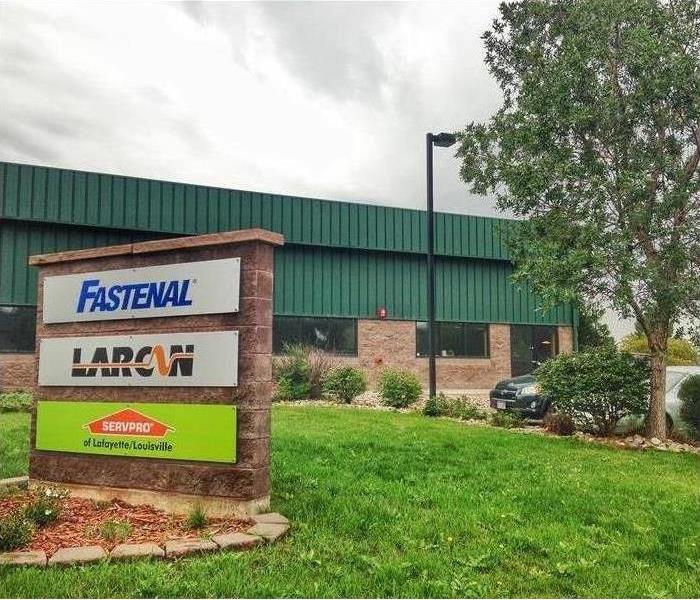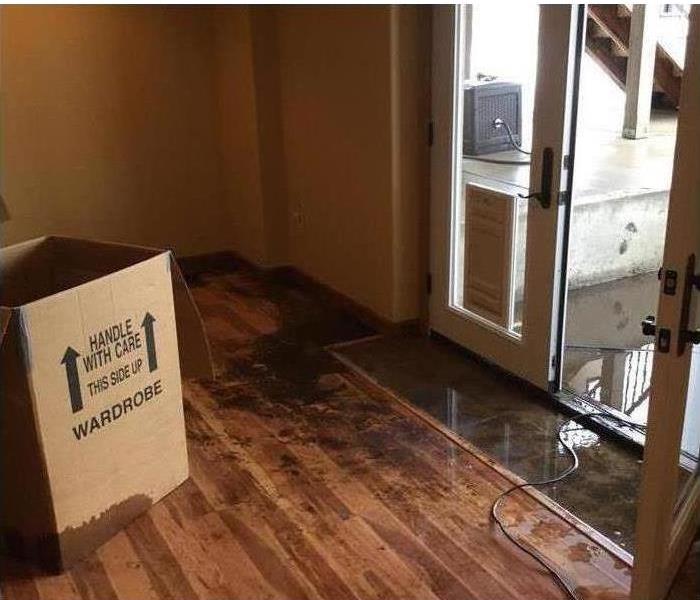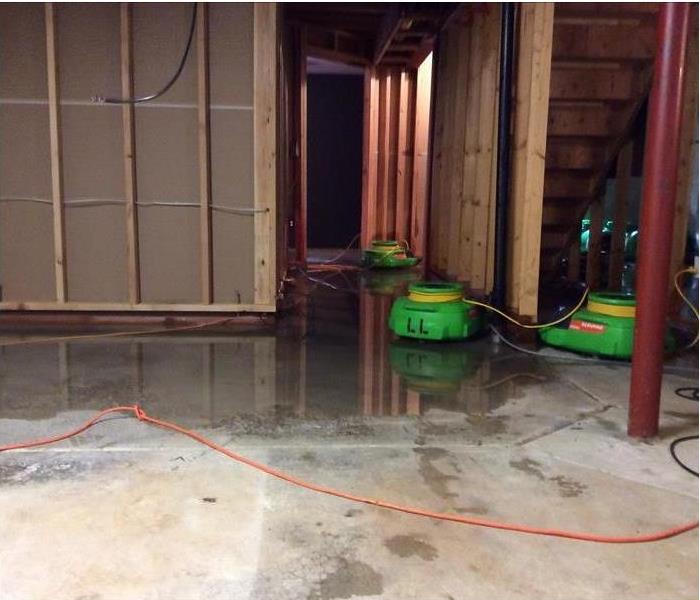Archived Why SERVPRO Blog Posts
5 Benefits of Regular House Plumbing Inspections
2/12/2023 (Permalink)
A plumbing inspection is a great way to make sure your house is running smoothly. It can help you avoid costly repairs and major issues down the line. It also helps to ensure that your home or business stays in great condition and performs at its best. Here are some of the top benefits of regular plumbing maintenance.
Saves Money in the Long Run
Regular plumbing inspections can help you save money in the long run by reducing the likelihood of major plumbing issues, reducing the need for emergency plumbing services and expensive repairs, and reducing the need for replacement parts.
As your home's plumbing system ages and wears down, it becomes more susceptible to damage from wear and tear as well. Regular inspections can identify these problems before they become too serious; this saves you time and money on costly repairs down the line.
Improved Water Pressure
The quality of your shower, dishwasher, washing machine, and toilet depends on water pressure. Without it, you may feel like the water trickles rather than pours when you turn on your faucets. Regular plumber inspections can improve your home’s plumbing so that it delivers the amount of pressure needed to meet all your household needs.
Similarly, when drains are slow to drain or don't drain at all—and toilets flush slowly—this means dirty water isn't being evacuated from the home as efficiently as possible. This leads to unnecessary waste that could clog up drains over time, which then requires professional help.
Improved Water Quality
Water quality is an important part of any home. In order to ensure that your water stays at its cleanest, regular house plumbing inspections are essential. A professional plumber will check for leaks in your pipes, identify potential problems before they arise, and provide maintenance advice so that you can keep up with the proper functioning of all aspects of your house plumbing system.
Prevents Major Issues Down The Line
The plumbing system in your home is a complex, interconnected system. If an issue develops in one part of the system, it can affect other parts of the system and cause problems throughout your property. For example, if an older water heater or drain clogs up and causes a major blockage in a pipe, this could lead to a sewage back-up into other areas of your house or business. If left untreated, this backup can cause structural damage that results in costly repairs. Regular inspections by experienced plumbers can help identify these issues before they become major problems that require extensive repairs or replacement work on your part.
Maintains Excellent Performance
Regular inspections of your plumbing system are an excellent way to prevent problems before they arise. These inspections will help keep your plumbing system in good working order, preventing leaks and burst pipes, and reducing the risk of flooding, water damage, mold growth, and health problems.
What’s Involved in an Inspection?
When you hire a professional plumber to inspect your home's plumbing, they will do a lot more than just look at what is going on. They will examine the following:
- the water pressure
- the supply lines
- the drains
- the toilets
- the faucets
- appliances such as your dishwasher, washing machine, and refrigerator
Regular Plumbing Inspections are Important.
Having regular house plumbing inspections is a great way to manage and maintain your home or business. We hope that we’ve convinced you to consider a plumbing inspection. If you do, then you’ll be glad that you did!
3 Ways To Lower Mold Spore Counts
8/21/2022 (Permalink)
Three Ways To Lower The Concentration Of Mold Spores
Mold spore counts will rise as long as fungal growth continues unabated in a commercial building. Building owners are responsible for the removal and remediation of mold, which may involve running a high-efficiency particulate air filter and scheduling air duct and carpet cleaning. Here are three of the best ways to lower the concentration of mold spores in a building located in Lafayette, CO.
1. Run a HEPA Filter
The vast majority of fungus spores range from two microns up to 20 microns, with some measuring as large as 100 microns. HEPA air filters capture and remove at least 99.97% of airborne particles larger than 0.3 microns.
Connecting a HEPA filter to a building HVAC system or running one or more free-standing air filtration systems rated for the size of interior spaces can make quick work of filtering out spores once the source of an infestation has been eliminated.
2. Schedule a Carpet Cleaning
Mold spores may settle down on a carpet over time or due to use of ionizing or electrostatic air filtration systems. Cleaning carpet is an important part of mold remediation and prevention.
Cleaning a carpet is most effective after mold cleaning. Carpeting is porous and may contain cellulose, a plant fiber that fuels mold growth.
Spores in carpet can recontaminate a structure. For this reason, remediation professionals often recommend tearing out porous flooring, airing out the subfloor, completing mold cleanup and drying the area before replacing carpet.
3. Have HVAC Ductwork Cleaned
Scheduling air duct cleaning can keep mold problems from returning. HVAC equipment and ductwork can be inspected for any signs of fungal growth and cleaned to stop spore circulation.
After active growth has been removed, spore counts should be lowered to forestall the recurrence of mold growth. Air filtration, carpet cleaning and duct cleaning can significantly lower spore concentrations at a commercial property in Lafayette, CO.
4 Benefits of a Claims Inventory System
3/14/2022 (Permalink)
 The SERVPRO Claims Information System is one of many features that can help an agent or adjuster settle an insurance claim.
The SERVPRO Claims Information System is one of many features that can help an agent or adjuster settle an insurance claim.
A Claims Inventory System Has 4 Advantages
Insurance companies prefer to work with mitigation and restoration services that maintain up-to-date systems. The SERVPRO Claims Information System enables an insurance agent to access the information he or she needs to process and settle an insurance claim. Here are four benefits of this system.
1. Access To Individual Claim Information
Insurance agents and adjusters can gain access to information for each claim through the Claims Information System. Local franchises upload damage information and estimates to an internal database. Documentation is then made available to representatives of property owners' insurance providers to facilitate the claim process.
2. Ease of Data Comparison and Research
Agents and adjusters can also access information to ensure that each estimate falls within the normal range nationwide and for the region, state, county or surrounding area of Boulder, CO. Discrepancies may be due to extenuating factors for a particular job, such as secondary damage. A claims inventory system makes it easy to sort data based on causes of loss, types of claims and job costs.
3. Shorter Processing Times
It may take less time to process an insurance claim if all of the information about the job is available in one convenient online resource. Insurers can access updated information at any time, which should prevent delays due to communication. An estimate that accounts for both damage mitigation and restoration may make it easier to settle a claim.
4. Updated Estimates and Job Information
Experienced mitigation professionals and the option for pretesting can increase the accuracy of initial estimates. If additional damage becomes apparent later in the mitigation or restoration process, this information is made available to agents and adjusters through the claims inventory system.
Insurance companies seek out Preferred Vendors for mitigation and restoration services. The SERVPRO Claims Information System is one of many features that can help an agent or adjuster settle an insurance claim.
SERVPRO Is Prepared for Major Storms
2/4/2022 (Permalink)
 Storm damage at this house resulted when a French door window was broken by flying debris during a storm. Fortunately, they called SERVPRO for help.
Storm damage at this house resulted when a French door window was broken by flying debris during a storm. Fortunately, they called SERVPRO for help.
SERVPRO Is Ready For Storms Of Any Size
What happens when a Valmont, CO, disaster recovery company doesn't have the equipment it needs? When a significant storm or disaster strikes, local companies aren't always prepared for an adequate storm response. The company many not have the necessary equipment or workforce to handle cleanup to the necessary expense. This is especially true when commercial properties are hit during a natural catastrophe.
• Hospitals and associated facilities require immediate disaster response services.
• Property managers are responsible for the safety of people in and around buildings.
• Universities and schools have large numbers of people and supplies onsite.
• Government facilities and program shutdowns affect many employees and members of the public.
Access to Corporate Resources
Fortunately, SERVPRO disaster recovery franchises have access to corporate resources. When local communities are hit by tornadoes, blizzards, or floods, storm response teams are mobilized from a network of carefully positioned centers. This means that if a blizzard knocks out power and services to a small community, resources from larger metropolitan areas can be used in response.
Preferred Vendor Status
The storm damage company works closely with many insurance companies and is often a preferred vendor. Residential and commercial customers may find they can get the go-ahead from their insurance providers for cleanup and recovery efforts more quickly when working with an approved storm damage recovery company.
Specialized Catastrophe Division
In the case of a true catastrophe, SERVPRO has a large loss division with specialists who have been trained to handle disasters of any size and specifically for exceptionally large disasters. These teams are ready to handle events like the Hurricane Katrina or California wildfires. The specialized team travels with resources pulled from more than 1,700 franchises and with access to a broad network of command centers.
When Valmont, CO, needs professional disaster recovery services, SERVPRO has the people, the equipment, and the training to help communities get back on track. They can step in when other options aren't enough.
A Timeframe for Damage Restoration Response
2/1/2022 (Permalink)
 This homeowner experienced water damage in his home after a large volume of water flowed from a burst water main. SERVPRO responded immediately.
This homeowner experienced water damage in his home after a large volume of water flowed from a burst water main. SERVPRO responded immediately.
An Estimated Timeline For Damage Restoration
Owners of homes that have sustained damage should start the mitigation and restoration process as soon as possible. Leading restoration companies are always open and can respond to a call, provide an on-site consultation, and offer a verbal briefing within a 24 hour window. Learn more about the timeframe for responding to any type of damage.
Call Response
A fast call response within one hour is ideal for a mitigation and restoration service. The initial communication should cover the following information about damage:
The next step is scheduling a consultation. For the best results, homeowners should make this call within a 24 hour period after damage occurs.
On-Site Consultation
Experts should arrive on location within four hours of a call response. These professionals can assess the degree of damage and recommend strategies to avoid additional damage. Homeowners should document damage for insurance purposes before taking any mitigation measures.
Verbal Briefing
A company should provide a verbal briefing within eight hours of an on-site assessment. This briefing should provide an overview of the remediation process:
- Mitigation measures
- Cleaning methods
- Restoration timeline
Each of these factors will impact the duration of the cleanup and rebuilding process and the overall estimate. A one-stop shop can oversee this process from start to finish.
Estimate and Schedule
A company can then provide an estimate for homeowners to forward to their insurance provider. Depending on the cause and type of damage, an insurer may or may not cover losses. Limits may also apply. Homeowners should review the terms of their coverage prior to filing a claim.
A mitigation and restoration company should provide a fast response and clear description of mitigation and restoration procedures. It may also be possible to obtain mitigation services within a 24 hour period, such as boarding up or tarping over structural damage at a residence in Valmont, CO.
Mold Damage and Insurance Coverage: 3 Common Questions
1/10/2022 (Permalink)
3 Common Questions About Mold Damage And Insurance Coverage
One of the most effective ways to protect your Boulder, CO, home from costly damage is by investing in homeowner’s insurance. From fire to theft, many different instances are covered. However, some issues, such as widespread fungus growth, may not have guaranteed coverage. If you are unsure about what your current policy covers, there are a few questions you can ask your local insurance agent to gain better peace of mind when it comes to protecting your home.
1. Does a Basic Policy Cover Mold Damage?
Most homeowner’s insurance does not cover circumstances that are most likely to cause mold growth, such as flooding from torrential rains or other weather events. If you live in an area that sees a lot of rain and high humidity, then it is a good idea to invest in a separate mold coverage policy that protects your home against such conditions.
2. Are Preventable Issues Covered?
Most insurance companies require you to perform regular maintenance around your home, especially in the case of fungus growth. For example, if you let your home’s roof fall into disrepair and melting ice and snow causes a leak in the attic that encourages mold growth, your policy is not likely to cover the damage. Keeping your home in good shape can prevent these issues and the costly repairs they may cause.
3. Is Mold Cleanup Covered By Insurance?
Whether homeowner’s insurance covers mold cleanup can depend on individual circumstances. For instance, if a kitchen water pipe bursts without warning and you do all you can to shut the water off and prevent further flooding, your policy will likely cover the cost of repair by a flood damage and restoration service. Buying separate mold insurance is one of the most effective ways to ensure complete coverage.
Fighting fungus growth at your Boulder, CO, home can be a frustrating experience. However, when you understand what type of support your homeowner’s policy offers, you may feel greater peace of mind when repairs are necessary.






 24/7 Emergency Service
24/7 Emergency Service

